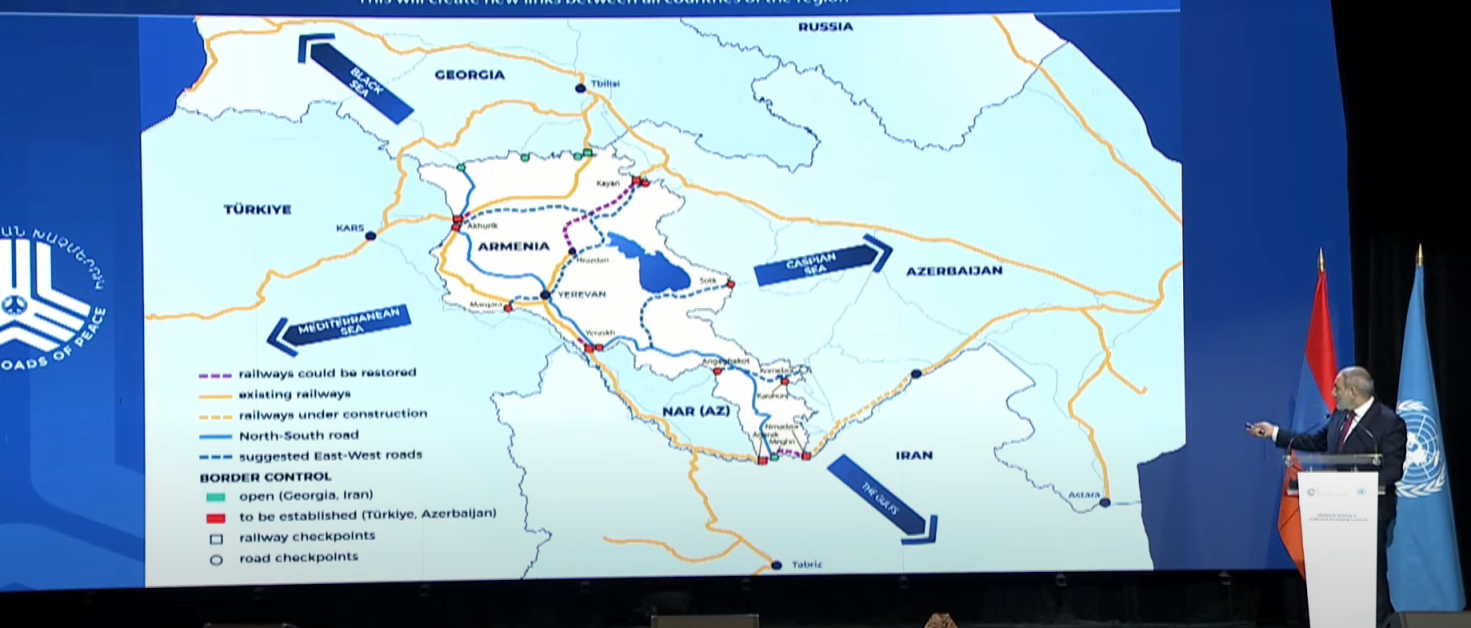
RA expresses readiness to restore railway communication between Azerbaijan and Armenia. Pashinyan
"Promoting equal, accessible and inclusive transport connectivity, dear representatives of the landlocked developing countries meeting held under the title "For Sustainable and Resilient Economies", I welcome all of you in Armenia to organize and attend this important event on this most important topic." RA Prime Minister Nikol Pashinyan said in his opening speech at the ministerial meeting of landlocked developing countries today, December 14.
"I must note that in general, over time, we are also reviewing the role of transport communications in the sense that usually our first perception is that transport communications are important for the movement of goods and people, but recently also due to our agendas, we record the importance of the role of transport communications in terms of regional stability, security and, in general, peace, the demand for peace and the establishment of peace, because it is our belief that we express in all international platforms that peace, first of all, the possibility of economic, cultural, political connections between peoples and is the presence. And these connections cannot happen without transport communications, and this is the reason why we have integrated our approach to the very important topic of opening regional communications in the "Crossroads of Peace" project, which is essentially about opening regional communications and is directly related to greater access to the sea," he said.
Pashinyan reminded that Armenia's borders with Turkey and Azerbaijan have been closed for 30 years. "Today we are discussing a lot about the possibility of opening regional communications, and I consider it very important to record here Armenia's readiness to take very active and real steps regarding the opening of communications in our region.
RA expresses its willingness to create and restore railway communication between Armenia and Azerbaijan, moreover, through the two railways that previously existed: the first is the northern route, which connects the Azerbaijani Ghazakh region with the Armenian Tavush region, the second is the southern route, which, among others, also connects the western regions of Azerbaijan with Nakhichevan. We believe that the western regions of Azerbaijan can be connected with Nakhichevan and the outside world also through the northern route. We have expressed this willingness officially.
The next one is about the motorways, which can have north, middle and south lanes, which will open up new opportunities for our region. Basically, through the "Crossroads of Peace", Armenia can connect with other countries along the north-south and east-west axis.
Moreover, we express the same willingness to open the Armenia-Turkey railway, as well as to reconstruct and reopen the two Armenia-Turkey highways, which, we believe, will have a significant impact not only on our region, but also on international economic relations, cultural and political ties in general, on global security issues," Pashinyan noted.
He presented the principles that should be the basis of the "Crossroads of Peace" operation. "The first is that all lines of communication must operate under the jurisdiction and sovereignty of the countries through which they pass. Next, each state, through its state institutions, provides border, customs control and security of all infrastructure in these communications within its territory. In order to solve this problem, recently by the decision of the RA government, a special unit was created in the NSS, the purpose of which is to ensure the security of regional communications.
The next principle is that all communications can be used for both domestic and international freight and communications. Countries use the infrastructure on the basis of the principle of equality and reciprocity, and some simplifications of procedures can take place on the basis of the principle of reciprocity and equality."
Pashinyan hopes that the "Crossroads of Peace" project will expand the opportunities of both Armenia and Azerbaijan to reach the sea, create wider opportunities for multimodal cargo transportation.
"All this is possible when peace is established between Armenia and Azerbaijan. The main question is how much peace is possible and within the framework of what principles it should take place," said Pashinyan, again presenting the principles put forward by Armenia, on the basis of which a "peace" agreement should be concluded.
Add new comment